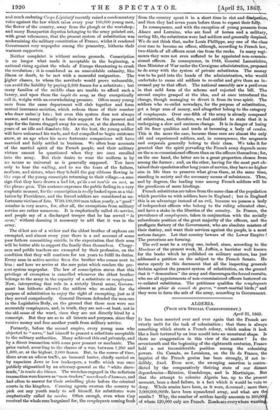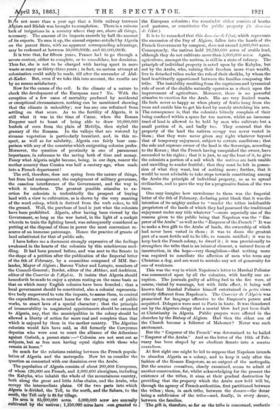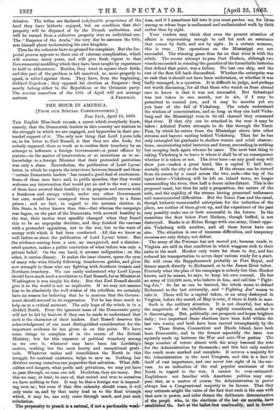ALGERIA.
(FROM oust SPECIAL CORRESPONDENT.)
April 21, 1863. IT has been asserted over and over again that the French are utterly unfit for the task of colonization ; that there is always something which stunts a French colony, which makes it look like a limb tortured by an iron mould into an unnatural shape. Is there no exaggeration in this view of the matter ? In the seventeenth and the beginning of the eighteenth centuries, France held a not inconsiderable position among the colonizing powers. On Canada, on Louisiana, on the Ile de France, the imprint of the French genius has been strongly, if not in- delibly, fixed. Even now, the sweeping assertion is contra- dicted by the comparatively thriving state of our distant dependencies—Reunion, Guadeloupe, and la Martinique. But that the attempt to colonize Algeria has, up to the present moment, been a dead failure, is a fact which it would be vain to deny. Whole armies have been, as it were, devoured ; more than 2,000,000,000fr. have been squandered away, and what are th results ? Why, the number of settlers hardly amounts to 200,00 of whom 120,000 only are French. Roads are everywhere wantin
It is not more than a year ago that a little railway between giers and Blidah was brought to completion. There is a ruinous lack of irrigations in a country where they are, above all things, necessary. The amount of its imports exceeds by half the amount of its exports. To sum it up, the annual expense entailed by Algeria on the parent State, with no apparent corresponding advantage, may be reckoned at between 50,000,000fr. and 60,000,000fr.
It is true that, for fifteen years, France hail to go through a severe contest, either to complete, or to consolidate, her dominion. Thus far, she is not to be charged with having spent in mere waste as many as thirty-three years ; in fact, no serious attempt at colonization could safely be made, till after the surrender of Abd- el-Kader. But, even if we take this into account, the results are by no means satisfactory.
Now for the causes of the evil. Is the climate of a nature to check the development of the European race ? No. With the exception of a few cases of mortality produced by accidental or exceptional circumstances, nothing can be mentioned showing that the climate is unhealthy; nor has any one refrained from settling on that score. As to the fertility of Algeria, it is still what it was in the time of Cesar, when the Roman Emperor used to boast of being able to draw 10,000,000 bushels of corn from the plain of Metidja, then styled the granary of the Romans. In the valleys that are watered by streams vegetation is particularly luxuriant, and, in this re- spect, as well as for salubrity, Algeria can fairly bear com- parison with any of the countries which emigrating colonies prefer. Moreover, the question of proximity is one of paramount importance, in reference to the saving both of time and money. Fancy what Algeria might become, being, in our days, nearer the mother country than Corsica was half a century ago, when made into a French department !
The evil, therefore, does not spring from the nature of things, but from bad management, the employment of military governors, the ceaseless interference of the Government, and the way in which it interferes. The greatest possible stimulus to ex- ertion for colonists is undoubtedly the prospect of buying land with a view to cultivation, as is shown by the very meaning of the word colony, which is derived from the verb colere, to till the ground. Well, the purchase of land is just what the colonists have been prohibited. Algeria, after having been viewed by the Government, so long as the war lasted, in the light of a cockpit wherein to train the fighting breed, was subsequently considered as putting at the disposal of those in power the most convenient re- source of an immense patronage. Hence the practice of grants of land substituted for that of public sale.
I have before me a document strongly expressive of the feelings awakened in the hearts of the colonists by this mischievous med- dling. It had been penned before, and was sent to the Senate in the shape of a petition after the publication of the Imperial letter of the 6th of February, by a committee composed of MM. Sar- landez, Mayor of Algiers ; Barons Viaher and Latapie, members of the Council-General ; Bordet, editor of the zikkbar, and Andrieux, editor of the Courrier de 'Alge'rie. It insists that Algeria should henceforth be made to enjoy a system resting on the same basis as that on which many English colonies have been founded ; that a local government should be constituted, also a colonial representa- tive body empowered to vote the imposts, to assess them, to control the expenditure, to contract loans for the carrying out of public works, to enact laws of a special character ; that the principle of irremovability in magisterial appointments should be extended to Algeria, nay, that the municipalities in the colony should be allowed a liberty of action far more real and complete than that which is enjoyed by them in the mother country. The Algerian colonists would fain have said, as did formerly the Corcyrwan deputies who were sent to court the alliance of the Athenians against Corinth, a parent state :—" Colonies are not sent out as subjects, but as free men having equal rights with those who remain at home."
So much for the relations existing between the French popula- lotion of Algeria and the metropolis. Now let us consider the question as connected with our dominion over the Arabs.
The population of Algeria consists of about 200,000 Europeans, of whom 120,000 are Freneh, and 3,000,000 aborigines, including the Kabylea, who inhabit the whole of the mountainous country, both along the great and little Atlas chains, and the Arabs, who occupy the intermediate plains. Of the two parts into which Algeria is divided, the Tell, to the north, and the Sahara, to the south, the Tell only is fit for tillage.
Its area is 35,000,000 acres. 5,000,000 acres are annually cultivated by the natives ; 1,250,000 acres have Jeen granted to
the European colonists ; the remainder either consists of heaths and pastures, or constitutes the public property (le dont-line de Mat.) It is to be remarked that this dont rine de reuti, which represents the succession of the Dey of Algiers, fallen into the hands of the French Government by conquest, does not exceed 5,000,000 acres. Consequently, the natives hold 28,750,000 acres of arable land, although they do not cultivate more than 5,000,000 acres. Again, agriculture, amongst the natives, is still in a state of infancy. The principle of individual property is acted upon by the Kabyles, but not by the Arabs, who, valuing their freedom more than wealth, live in detached tribes under the rule of their sheikhs, by whom the land is arbitrarily apportioned between the families composing the tribe. The instability resulting from the capricious and tyrannical rule of most of the sheikhs naturally operates as a check upon the improvement of agriculture. Moreover, there is no powerful stimulus to exertion for the Arab. His are very limited wants. He feels never so happy as when plenty of fruits hang from the trees and enable him to get his food by merely stretching his arm. The consequence is, that the colonists bitterly complain of their being confined within a space far too narrow, whilst an immense tract of land is allowed to be held by men who cultivate but a small portion of it, and badly too. They contend that the property of the land the natives occupy was never vested in them ; that they were never given any right whatever beyond that of temporary enjoyment, subject to certain conditions ; that the sole and supreme owner of the land is the Sovereign, according to the Koran ; that the French having vanquished the owner, have succeeded to his rights ; that it is just, to say the least of it, to give the colonists a portion of a soil which the natives are both unable and unwilling to render fruitful ; that they must be left in posses- sion of what they want, but of nothing more ; further, that it would be most advisable to take steps towards constituting among the Arabs the principle of individual property, so as to spread civilization, and to pave the way for a progressive fusion of the two races.
One may imagine how unwelcome to them was the Imperial letter of the 6th of February, declaring point blank that it was the intention of its mighty author to "render the tribes indefeasible proprietors of the lands of which they had possessed the traditional enjoyment under any title whatever "—more especially one of the reasons given to the public being that Napoleon was the "Em- peror of the Arabs" as well as the "Emperor of the French I" It was to make a free gift to the Arabs of lands, the ownership of which had never been vested in them ; it was to doom the greatest part of a most fertile soil to lie idle, to remain untilled ; it was to keep back the French colony, to dwarf it ; it was provisionally to strengthen the tribe that is an inimical element, a natural focus of insurrection, in the hope—very thoughtless—that nothing more was required to conciliate the affection of men who term any Christian a dog, and are wont to mistake any act of generosity for one of weakness.
This was the way in which Napoleon's letter to Marshal Pelissier was commented upon by all the colonists, with hardly one ex- ception. The journals guilty of adding fuel to the fire were, of course, visited by warnings, but with little effect, it being well known that Marshal Pelissier himself entertained in petto views entirely different from Napoleon's. The Courrier de l'Alydrie was prosecuted for language offensive to the Emperor's person and acquitted. Delegates were sent to Paris in haste. It was thundered out by the Algerian clergy that a mortal blow had just been dealt at Christianity in Algeria. Public prayers were offered in the churches by the Bishop of Algiers. Had then the eldest son of the Church become a follower of Mahomet ? Never was such excitement.
But the "Emperor of the French" was determined to be hailed "Emperor of the Arabs." And so the letter of the 16th of Feb- ruary has been shaped by an obedient Senate into a senates consult urn.
At first sight one might be led to suppose that Napoleon intends to abandon Algeria as a colony, and to keep it only after the fashion of the Roman Emperors, as an outpost of the metropolis. But the serzatus contultum, closely examined, seems to admit of another construction, for, whilst acknowledging for the present the existence of the tribes, it aims at their gradual destruction by providing that the property which the Arabs now hold will be, through the agency of French authorities, first partitioned between the tribes ; then, in each tribe, between the donors—the douar being a subdivision of the tribe—and, finally, in every 4uar, between the families.
The gift is therefore, so far as the tribe is concerned. perfectly delusive. The tribes are declared indefeasible proprietors of the land they have hitherto enjoyed, but on condition that their property will be disposed of by the French authorities, and will be turned from a collective property into an individual one. The "Emperor of the Arabs," the very day he assumes the title, sets himself about undermining his own kingdom.
Thus far the colonists have no ground for complaint. But the Im- perial process appears to them one of extreme complication, which will consume many years, and will give fresh vigour to that Governmental meddling which they have been taught by experience to hold in abhorrence. Bides, they want to square their fields, and this part of the problem is left unsolved, or, more properly to speak, is solved against them. They have, from the beginning, disliked Napoleon ; they opposed his election as Emperor ; they mostly belong either to the Republican or the Orleanist party. The senatus consultnm of the 13th of April will not arrange
































 Previous page
Previous page